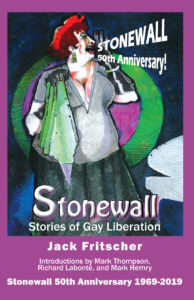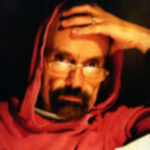
Chapter also available in PDF
There is more diversity
in this sterling collection of short stories
by one author than there is in some anthologies
with a dozen authors.”
Tribal Words, Our Queer World
Richard Labonté
A Different Light Bookstores,
www.BooksToWatchOutFor.com
We have always had our words.
In the centuries before print, “men met men” and “women met women” through glance and touch and whispered words that led us to each other.
Then words were written — within our lifetimes, enough words that entire gay bookstores can be stocked with them.
In Greenwich Village in 1967, first came the “Oscar Wilde” bookstore with shelves of “words” by literary titans such as James Baldwin and Truman Capote, Tennessee Williams and Jean Genet, Christopher Isherwood and Gore Vidal, John Rechy and Paul Bowles.
Emboldened by the Stonewall Rebellion of 1969, more bookstores followed: “Glad Day,” Toronto, 1970; “Giovanni’s Room,” Philadelphia, 1973; “Lambda Rising,” Washington, D.C., 1974; and “A Different Light” in the Silver Lake neighborhood of Los Angeles, a store long gone — but celebrated in memory for itself and for its offspring — for a time in New York, and still in business in West Hollywood and San Francisco. The “Outwrite” bookstore founded in Atlanta, 1993, continues the tradition of selling queer words in queer books by queer authors to a diversity of readers.
These post-Stonewall bookstores, and the words stocked on their shelves, have been a catalyst for a Gay Liberation Movement that was inspired by the drag queens, the gay boys and girls, and the leathermen — by the queers — who took to the streets outside the Stonewall Inn to protest the “words” used against us. “No more.”
Forty years ago, there was no Internet. Gay bookstores were the chat rooms of our queer nation. The books on the shelves, the magazines providing news, the encouraging staff behind the counter — that was how our words were passed on, from one person to the next, from one generation to the next. The revolution started in the streets, but it spread through typewriters and printing presses. It seems quaint, in this era of instant online access and books-on-demand and one-click shopping through the sterile interface of a desktop computer — but, in their day and even today, bookstores and the words they contained brought gay men and gay woman together, served as social centers, and as information resources.
We can celebrate the Internet: young queers come out sooner, meet each other more easily, plug in to knowledge bases in the privacy of the bedrooms, read copious book reviews if they choose, learn that they are not alone. Using the Internet, elder queers keep in the swim of words and books.
That said, bookstores still matter, as repositories of literary history, as places where books can be handled, browsed, discussed. Breathed in, even — that’s really quaint. Books like this one, which does what queer words do best: bring our past to life, put a fictional twist on queer fact, entertain us intellectually, emotionally, vicariously, viscerally, sexually. Imaginatively.
Jack Fritscher has been doing that work with words for five decades, though dozens of books and hundreds of short stories and thousands and thousands of words, chronicling successive gay eras with a wordsmith’s sure touch.
As I have written about one of his other solo anthologies, I can repeat: “There is more diversity in this collection of short stories by one author than there is in some anthologies with a dozen authors.”
“Stonewall: June 27, 1969, 11 PM,” the centerpiece story of this sterling collection, perfectly captures the bitchy bravura of that moment in time, of that particular night, of the defiant queens and queers who fought back: it’s fiction that encapsulates fact, and expands it, and explains it.
The crowd being herded out the front door (torn from its hinges), turns, curious, muted, shocked, at the precise instant Sylvia hits the cop, again, with an open-handed bitch-slap heard round the world.
Indeed. Through the wonder of words, we are there, we who weren’t there, we who were not even born then, we who — books live on — have not yet come out.
We will always have our words.
Richard Labonté
Bowen Island, Canada
